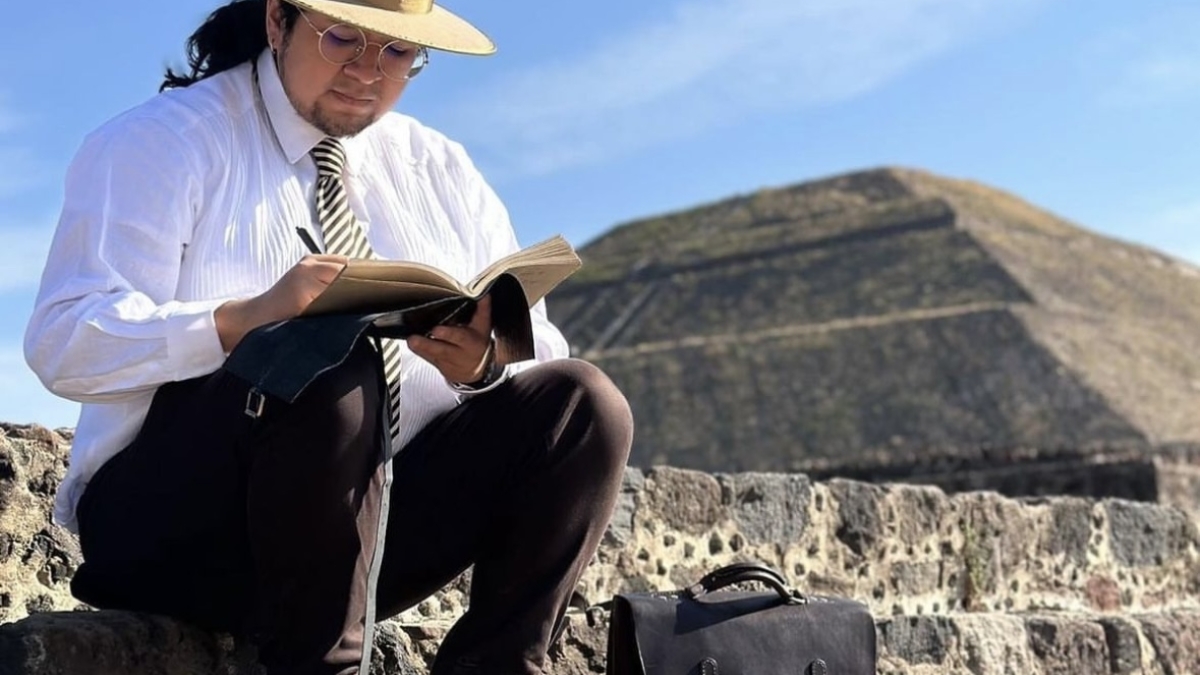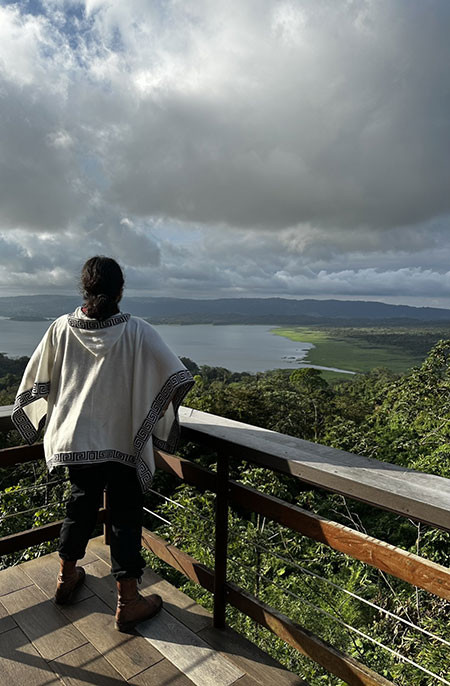ASU graduate finds passion in sociocultural anthropology

Jason Bautista Pejay is graduating this spring with a Bachelor of Arts in anthropology from the School of Human Evolution and Social Change.
Editor's note: This story is part of a series of profiles of notable spring 2023 graduates.
Jason Bautista Pejay, a Flinn Scholar and student at Barrett, The Honors College, is graduating this spring with a Bachelor of Arts in anthropology from the School of Human Evolution and Social Change.
Bautista Pejay said it took him time to find his true passion in college.
“It would take years of growth through exploration in the different fields of anthropology and unlearning the internalized racism that made me avoid academic spaces for so long, but eventually I found my place as a globetrotting, tarot-reading, Indigenous Mexican writer in the sociocultural branch of anthropology,” Bautista Pejay said. “Today, I am on my first ever personal project, an autoethnography, with my honors thesis director. Anthropology will always be my first love, and I only look forward to where it will take me post-undergrad.”
Bautista Pejay is also a member of CKI International and Solis Diaboli (Classics Club). He talked with ASU News about his experience as a first-generation Indigenous Mexican student.
Note: Answers have been edited for length and clarity.
Question: What was your “aha” moment when you realized you wanted to study the fields you majored in?
Answer: I spent my first two years of college hopping from major to major, still convinced I was all about making money and starting a business like my Mexican parents always encouraged. I think I changed majors a total of six times.
Around that time, I felt a craving for the stereotypical college humanities experience that I felt I was missing out on, so I got to digging. I needed to catch up on honors credit, so Barrett’s summer course catalog was the first place I checked. I found a class titled “Fairies, Demons and Monsters Imagining the Wild.” This type of stuff always interested me, but I could never find a place to really engage with it at home; plus I would usually write it off as “white people stuff.”
I was immediately hooked. The readings brought me such childlike joy and curiosity that I had never experienced up to that point in college. I had undiagnosed ADHD at the time, so engaging with material that I enjoyed for its own sake was a needed reprieve after two years of stuffing myself in boxes that weren’t for me.
Seminar discussion on American values in "Where the Wild Things Are," problematic depictions in (Dungeons and Dragons) "Monster Manuals," critical analysis of colonial allegories in horror movies like "Ravenous" — I ate it all up. I was riding a rejuvenating high that summer. I began to feel that there was a point to college. That summer was when I finally began to feel like myself again.
I started to wonder where I would go after this. I wanted more but I didn’t really see a major that would let me keep studying this. I also knew I wanted to add a cultural element to it, since culture was my bread and butter, even in the majors that didn’t work out.
Jason Bautista Pejay looks out over Lake Arenal in Costa Rica.
One day, during one of our Zoom classes, I overheard a classmate say something that caught my attention. We were talking about some random subject while discussing a story called “The King of The Elves,” and a classmate said, “Oh, we used to talk about this all the time in my anthropology class.”
I thought to myself, “Anthropology — what does that mean?” I had heard the word before, but I never looked into it. I went to Google and looked up a definition.
I also asked the friend, who I had spent the summer texting back and forth about my class and other nerdy things. “Hey, should I change my major to anthropology?” “Yes, absolutely you should.”
Since that day, I’ve never looked back.
Q: What’s the best piece of advice you would give to students?
A: The most important time is now. What we do now creates who we will become. Whether you desire change from who you were in the past, or who you want to become in the future, you must do it here in the moment.
It’s not instantaneous or linear. It’s more like a rehearsal. You definitely get tired of it at times, but if you stay consistent, over time it begins to feel more natural until suddenly, you’re not trying anymore, it’s just who you are now. Cycles aren’t broken; they’re interrupted and redirected. And don’t do it alone. I am because we are. No one has ever truly done it all alone.
Q: What was your favorite spot on campus, whether for studying, meeting friends or just thinking about life?
A: The Labriola National American Indian Data Center has become a home away from home. It’s where I rediscovered my Indigenous roots and became part of a community that helped lift me out of a very dark time in my life and reconnect with myself. Doing my part and giving back to the center in my own way has only helped ground me more.
Q: What are your plans after graduation?
A: I’m applying to programs like the Worldwide Opportunities on Organic Farms, or WWOOF, to go and be a farmhand across the country and around the world to learn more about sustainable living, write freelance, study the tarot and connect with more people. After all is said and done, I’ll use the knowledge I’ve gained to ask new questions and apply to an interdisciplinary humanities graduate program.
Q: If someone gave you $40 million to solve one problem on our planet, what would you tackle?
A: The money would go toward ethical sustainable living education and implementation that promotes Indigenous knowledge of the land to help people live off and take care of each other and the environment in more proactive ways.
More Arts, humanities and education

2 ASU professors, alumnus named 2025 Guggenheim Fellows
Two Arizona State University professors and a university alumnus have been named 2025 Guggenheim Fellows.Regents Professor Sir…

No argument: ASU-led project improves high school students' writing skills
Students in the freshman English class at Phoenix Trevor G. Browne High School often pop the question to teacher Rocio Rivas.No,…

ASU instructor’s debut novel becomes a bestseller on Amazon
Desiree Prieto Groft’s newly released novel "Girl, Unemployed" focuses on women and work — a subject close to Groft’s heart.“I…


